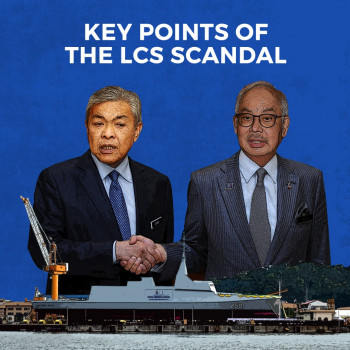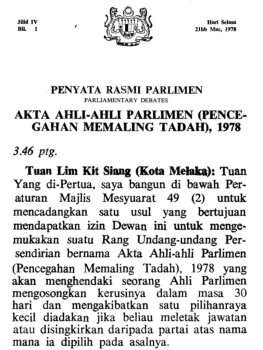 In 2008 Malaysians made the unprecedented political change of electing a record five Pakatan Rakyat state governments. However for many, it seems as though the political change has not been translated into their daily lives.
In 2008 Malaysians made the unprecedented political change of electing a record five Pakatan Rakyat state governments. However for many, it seems as though the political change has not been translated into their daily lives.
This stems from the unequal structure of governing power in which the federal government controls almost every aspect of people’ lives while the states are left with little power. The Rocket’s T.K Tan asks Tricia Yeoh to explain some of the nuances of Malaysia’s federalism, why we need decentralisation and crucially, why PR is the best alternative to achieve it.
Almost unitary in nature
Officially, Malaysia practices federalism with different levels of government having sovereignty over their respective jurisdiction. In essence according to Tricia, “Malaysia has a very strong federal government that has extensive administrative authority, policy making and control of fiscal resources,” Tricia began.
On the other hand the states are left with control in land matters, forest resources, religion and local councils.
What are some examples of the federal government’s (FG) ordering of our lives? Tricia gave the example of the public bus system.
“The FG via the Land Public Transport Commission (SPAD) controls the public bus system in all states. Can we expect a Putrajaya-based federal agency which may not even have federal offices in all the states to monitor and decide what are the best routes and number of buses in the states?”
Another federal dominance in state governance is the appointment of department heads and staffs for the state bureaucracy.
“Many of the states are encumbered as their high-level staffs need to be recruited, vetted and approved by the Public Service Department (PSD), a federal agency,” she mentioned.
“In Selangor the state secretary, state financial and legal officer sits in the exco meeting. They are all hired by PSD. These civil servants come from the same pool of bureaucracy that shares the same scale of remuneration and pension benefits with their federal counterparts.”
Conflicts of interest abound as the FG evaluates these civil servants although they serve the state government (SG). Would they not be more inclined to abide by the FG’s wishes and not the SG’s directives?
“As an example, even though the local councils are under the SG’s jurisdiction, the council staff are answerable to the FG.”
“Some of the local council heads in Selangor have been recalled by the FG recently; it is how the FG exercised power over these state civil servants. The former MPSJ head was recalled by the FG and now serves as the secretary general of the Federal Territories (KL), a promotion for him,” she explained.
“In the past there was only one political master to serve, BN, at all levels of government. As a result of the past culture imbibed into them, many older state civil servants were conservative in carrying out their duties, doing it by the book and not much more. It is out of habit as well.”
Why decentralisation needed
The question arises as to why we need decentralisation of governance, if the authority, whetherFG or SG, is delivering the services needed.
“The government that is closest to the people would make better and more flexible decisions in solving their local problems arise. It’s about efficiency and effectiveness of service delivery,” she explains.
“In a people-centric governance, it is logical and reasonable to expect that the government closest to the people would be able to make the better decisions.”
“There should be a direct feedback process in place to help the local government solve the problems that arise instead of having to go through the entire chain of feedback to the federal headquarters in Putrajaya.”
Will the people be more satisfied with decentralisation? “We need to educate the people to be empowered and take over the local governing functions related to them. When they own it and implement it themselves, they will be satisfied about decentralisation.”
Tricia points out that there are certain preconditions that need to exist for decentralisation to work. “When local authorities are given more power, they also need more fiscal power to carry out their administrative and development functions.”
Does that mean all the states are ready for full fiscal autonomy? “We need to look at the level of development of the states. Selangor may contribute more than 20 percent of the total amount of taxes collected by FG; it doesn’t mean that it should receive all that amount collected.”
“Some states such as Kelantan and Perlis need additional funding from the FG to help out in their physical development.”
Tricia believes decentralisation of fiscal authority is good for the country as a whole. “Giving more fiscal authority to the states means they will compete amongst themselves for more investments and sources of revenue and improve on their revenue collection efforts.”
However Tricia is sceptical about Malaysia’s readiness for decentralisation in the immediate future. “It may take 5 to 10 years for the people to take up more self-rule of the local issues and governance. In other countries such as India there is a very strong sense of self-rule and autonomy.”
“Without a bottom-up driven demand, it’s hard to galvanise a movement to ask for more decentralisation and power to rule ourselves. We have grown accustomed to an overpowering unitary authority that took care of the issues and problems faced by the people that we have surrendered this attitude of ownership of governance,” she lamented.
“This empowerment process means educating Malaysians to take back these basic functions. We can’t rely on the FG to regulate and run our lives as they are getting more bloated by the day.”
“This process will take time as the Indonesian example shows. There was an entire change in the governing mindset and structure. But look at how Indonesia has benefitted. In essence, we are saying, who knows your problems best and who better to handle them if not the government closest to you.” -The Rocket



